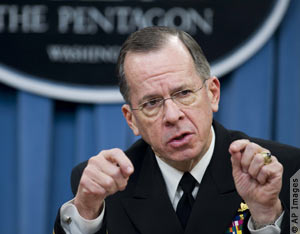President Barack Obama
Obama Meets with Top Aides on Libya
20 March 2011

Admiral Mike Mullen, chairman of the Joint Chiefs of Staff
President Obama held a conference call with top national security advisers March 20 to discuss the international effort to enforce a no-fly zone over Libya to stop Libyan military forces from attacking civilians, the White House says.
Obama, who is currently traveling in Latin America, had a secure conference call with National Security Advisor Tom Donilon, Secretary of State Hillary Rodham Clinton, Defense Secretary Robert Gates, White House Chief of Staff William Daley, AFRICOM Commander General Carter Ham and Deputy National Security Advisor Denis McDonough, the White House said.
Ham, who recently assumed command of the Stuttgart, Germany-based U.S. Africa Command, briefed the president.
“President Obama received a briefing from General Ham on U.S. military operations in Libya, as part of the international effort to enforce U.N. Security Council Resolution 1973,” the White House said. “The president also discussed the ongoing military and diplomatic consultations taking place on the situation in Libya.”
Clinton had just returned from a one-day trip to Paris on March 19, where she had met with European and Arab leaders on final steps to enforce the U.N. resolution authorizing a no-fly zone. Obama is traveling to Brazil, Chile and El Salvador March 19–23.
The U.N. resolution was approved by the Security Council by a vote 10-0 with five abstentions on March 17. It authorizes the use of all means necessary, including a no-fly zone, to halt the military forces of Libyan leader Muammar Qadhafi from attacking the Libyan people. The resolution also demands an immediate cease-fire among other measures.
Vice President Biden spoke by telephone March 20 with Algerian Prime Minister Ahmed Ouyahia and Emir of Kuwait Sheikh Sabah Al-Ahmad Al-Jaber Al-Sabah as part of ongoing consultations on coalition actions in support of the U.N. security resolution, the White House said.
“The vice president discussed with both the Prime Minister and Emir their mutual support for the full implementation of the resolution and the need to protect the Libyan people,” the White House said.
Admiral Mike Mullen, the chairman of the U.S. Joint Chiefs of Staff, said March 20 on CNN’s State of the Union news show that a no-fly zone over Libya is “effectively in place.” He said that the current strategy of the international coalition is to block logistical support to Qadhafi’s forces, which range from Tripoli in the west to the outskirts of the eastern coastal city Benghazi.
Mullen said during another interview on NBC’s Meet the Press that this was a limited military mission for the United States and there will be no U.S. military ground forces introduced into this operation. “This isn’t about occupation in any shape or form,” Mullen said on the program.
The goal is for Qadhafi to withdraw his forces back into their garrisons and stop attacking civilians who have been protesting against his 42-year reign, Mullen said. Since the no-fly zone was imposed March 19, the Libyan military has grounded its aircraft and helicopters, Mullen said.
U.S. and British Navy ships and submarines fired 112 highly precise Tomahawk cruise missiles at more than 20 air defense, communications and command facilities to clear an air corridor for international military aircraft to establish air patrols and ground Libya’s air force, Vice Admiral William Gortney, director of the Joint Staff, told reporters at a March 19 Pentagon briefing in Washington.
“We’re on the leading edge of … coalition military operations designed to enforce United Nations Security Council Resolution 1973 in Libya,” Gortney said.
“The goals of these initial operations are essentially twofold:
first, to prevent further attacks by regime forces on Libyan citizens
and opposition groups, especially in and around Benghazi; and second, to
degrade the regime’s capability to resist the no-fly zone we are
implementing under that United Nations resolution,” he said.
The targets chosen by coalition forces were selected based on an assessment that these sites posed either a direct threat to coalition aircraft enforcing the no-fly zone or a direct threat to the people of Libya, Gortney told reporters.
In addition to the sea-launched cruise missiles that struck more than 20 integrated air defense systems and communications and command facilities, U.S., British and French military planes stopped Qadhafi’s armored forces that were attacking the opposition-held city of Benghazi. Military aircraft from other nations are expected to join in the no-fly zone operations as early as March 20, Mullen said.
“These strikes were carefully coordinated with our coalition partners,” Gortney said. “I want to stress, however, that this is just the first phase of what will likely be a multiphased military operation designed to enforce the United Nations resolution.”